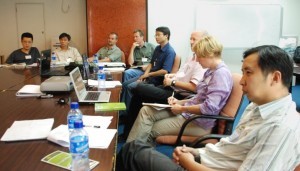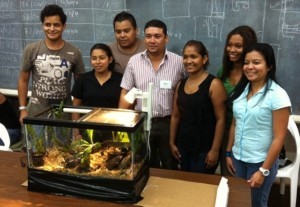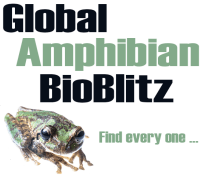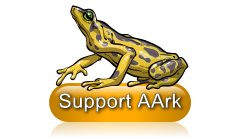Two of Amphibian Ark’s main activities include:
- facilitating the assessment of the conservation needs of amphibian species and prioritizing species for those most in need of conservation action, and
- capacity-building for the ex situ management of amphibians for research or rescue, in countries where additional expertise is required
Focussing on the species that are most in need
 To help determine which species are most in need of ex situ conservation programs, and which of those programs are more likely to have the most successful outcomes, AArk staff work with field scientists and researchers to assess the conservation needs of all amphibian species. We work closely with local Amphibian Specialist Group (ASG) Chairs to assemble a team of experts with current knowledge of amphibian populations in the wild, and the threats they face, to collectively assess each species for their conservation needs, and prioritize each species for action. Most of the assessments to date have taken place during physical workshops, but in 2015, an online conservation needs assessment program was developed, and this can be used either in a workshop situation, or by individual assessors.
To help determine which species are most in need of ex situ conservation programs, and which of those programs are more likely to have the most successful outcomes, AArk staff work with field scientists and researchers to assess the conservation needs of all amphibian species. We work closely with local Amphibian Specialist Group (ASG) Chairs to assemble a team of experts with current knowledge of amphibian populations in the wild, and the threats they face, to collectively assess each species for their conservation needs, and prioritize each species for action. Most of the assessments to date have taken place during physical workshops, but in 2015, an online conservation needs assessment program was developed, and this can be used either in a workshop situation, or by individual assessors.
Since 2007, AArk’s Conservation Needs Assessment process has been used at 32 national and regional workshops to assess the conservation needs of over 3,200 of the world’s amphibian species. Assessment information is provided by the local ASG members, with recommendations for one or more of eleven different conservation actions, both in situ and ex situ, being generated for each species. The resulting recommendations are then used to guide local and national action plans and to determine priorities.
Building capacity in range countries
 Since 2007, several organizations including Durrell Wildlife Conservation Trust, the Association of Zoos and Aquariums (AZA) and Amphibian Ark have run more than 60 ex situ amphibian conservation training workshops, in 31 countries, and have collectively trained over 1,800 amphibian conservationists. While each of these three organizations have their own staff who have either helped develop training programs or provided training at these workshops, the bulk of the lecturers have been amphibian or veterinary staff from within the zoo aquarium community.
Since 2007, several organizations including Durrell Wildlife Conservation Trust, the Association of Zoos and Aquariums (AZA) and Amphibian Ark have run more than 60 ex situ amphibian conservation training workshops, in 31 countries, and have collectively trained over 1,800 amphibian conservationists. While each of these three organizations have their own staff who have either helped develop training programs or provided training at these workshops, the bulk of the lecturers have been amphibian or veterinary staff from within the zoo aquarium community.
The commitment of the trainers at these workshops, and the support of their institutions are imperative to the success of the training, and the opportunities provided to the participants to work alongside and be mentored by some of the world’s most successful amphibian conservationists are always well-received. The students also know that they can rely on the trainers to remain as their mentors and professional contacts throughout their careers.













